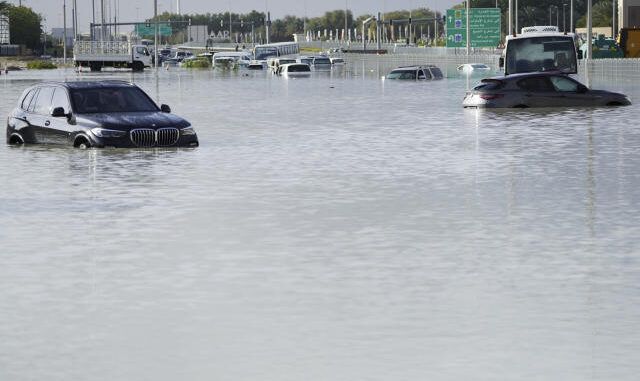
Leading meteorologist Johan Jaques has warned of looming ‘weather wars’ between nations if ‘cloud seeding’ gets out of hand
His warning follows after the recent flooding in Dubai sparked concerns about artificially manipulating the rainfall.
Jaques, a senior meteorologist at environmental technology company KISTERS, warned there could be ‘unintended consequences’ to using the technology which could potentially lead to ‘diplomatic instability’.

BYPASS THE CENSORS
Sign up to get unfiltered news delivered straight to your inbox.
You can unsubscribe any time. By subscribing you agree to our Terms of Use
He told the Mail Online: “Any time we interfere with natural precipitation patterns, we set off a chain of events that we have little control over…..Interference with the weather also raises all kinds of ethical questions, as changing the weather in one country could lead to perhaps unintended yet catastrophic impacts in another. After all, the weather does not recognise international borders.”
Extreme weather, and concerns about climate chane and possible manipulation, have received attention in recent days with flooding in Dubai causing widespread disruption and damage to infrastructure.
The United Arab Emirates this week suffered horrendous floods which swamped the airport and many of the surrounding roads, forcing dozens of flights to be cancelled as travellers crammed into the concourse to shelter from the torrential downpour.
Videos shared on social media showed how cars were filled with water, forcing hundreds of motorists to abandon their vehicles and swim to safety.
The damage to the region was brought on by abrupt torrential rain, with more than 142mm falling on Dubai in just 24 hours – as much as the city would usually expect to see in a year.
The freak weather shift sparked concerns about cloud seeding, a process used since the 1940s by which planes equipped with specialised flares release salt into clouds to encourage rainfall.
While officials have denied the role of cloud seeding in this week’s floods, the UAE has used cloud-seeding to prompt rainfall since the 1990s.
Mr Jaques said that intense precipitation brought on by cloud seeding could lead to ‘excess flow, with potential flash floods as a result’, as reported by Newsweek.
‘The Dubai floods act as a stark warning of the unintended consequences we can unleash when we use such technology to alter the weather,’ he said.
‘Additionally, we have little control over the aftermath of cloud seeding. Where exactly is it going to be raining effectively?
‘Using techniques such as cloud seeding to bring much-needed rainfall in one area can cause flash floods and droughts in another.’
‘Anytime we interfere with natural precipitation patterns, we set off a chain of events that we have little control over,’ he added.
Ahmed Habib, a meteorologist at the UAE’s National Centre for Meteorology (NCM), told Bloomberg several cloud-seeding sorties were flown in the days before the unprecedented rainfall hit.
Speculation about the use of cloud seeding later caused the NCM to deny the operation had taken place on Tuesday in the hours before the storm – but said it was performed on Sunday and Monday.
Maarten Ambaum, a professor of atmospheric physics and dynamics at the University of Reading, suggested that while cloud seeding could be used to create rain, ‘you would not normally develop a very severe storm out of that’.
‘In the 50s and 60s, people still thought about using cloud seeding to produce these big weather events, or change these big weather events.
‘This [has] long been recognised as just not a realistic possibility.’


